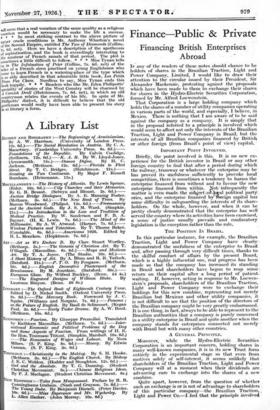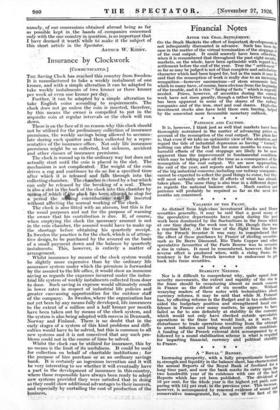Finance-Public & Private
Financing British Enterprises Abroad
Is any of the readers of these notes should chance to be holders of shares in the Brazilian Traction, Light and Power Company, . Limited, I would like to .draw their attention to the circular issued by their President, Sir Alexander Mackenzie, protesting against the proposals which have been made to them to exchange their shares for shares in the Hydro:Electric Securities Corporation, formed by Mr. Alfred Loewenstein.
That Corporation is a -large holding company which holds the shares of a nuinber of utility companies operating in various parts of the world, and especially, I believe, in Mexico. There is nothing that I am aware of to be said against the company as a company. It is simply that in the propoSal referred to a principle is involved which would seem to affect not only the interests of the Brazilian Traction, Light and Power Company in Brazil, but the interests of all Brazilian companies financed by British or other foreign (from Brazil's point of view) capital.
IMPORTANT POINT INVOLVED.
Briefly, the point involved is this. It is no new ex- perience for the British investor in Brazil or any other- foreign country to find that • after a period during which the railway, tramway or whatever the enterprise may be has proved its usefulness :Sufficiently to provoke local competition, there is sometimes a tendency to harass the enterprise financed from without and to favour the new. enterprise financed from within. ot., infrequently the- matter is -even -4nade the subject o al political party; cries, and the enterprise financed by eign capital has' some difficulty in safeguarding the interests of its share.-- holders. On the whole, however, and when it can be pretty clearly demonstrated that the enterprise has well served the country where its activities have been exercised, a sense of justice usually prevails and confiscatory legislation is the exception father than the rule.
THE POSITION IN BRAZIL. • In this particular instance, for example, the Brazilian Traction, Light and Power Company have clearly.: demonstrated the usefulness of the enterprise to Brazil - and, after passing through very difficult times, thanks to the skilful conduct of affairs by the present Board, which is a highly influential one, real progress has been made so that the company has increased its standing. in Brazil and shareholders have begun to reap some return on their capital after a long period of patient. waiting. If, however, acting in response to Mr. Loewen- stein's proposals, shareholders of the Brazilian Traction, Light and Power Company were to exchange their holdings for this new combine, representing not merely Brazilian but Mexican and other utility companies, it is not difficult to see that the position of the directors of the Brazilian company might be very greatly embarrassed. It is one thing, in fact, always to be able to represent to the Brazilian authorities that a company is purely concerned in a utility enterprise in Brazil and quite another when the company stands for enterprises connected not merely ■ with Brazil but with many other countries.
A GENERAL PRINCIPLE. • Moreover, while the Hydro-Electric Securities Corporation is an important concern, holding shares in - many well-known companies, it is in its new Trust form entirely in the experimental stage so that even from motives solely of self-interest, it seems unlikely that shareholders of the Brazilian Traction, Light and Power . Company will at a moment when their dividends are . advancing care to exchange into the shares of a new combine.
Quite apart, however, from the question of whether such an exchange is or is not of advantage to shareholders of this particular company-the Brazilian Traction Light and Power Co.-I feel that the principle involved. namely, of our concessions obtained abroad being as far as possible kept in_the hands of concerned only with the one country in.question, is-so important that I have deemed it 'worth while t:45 make if the subject of this short article in the Spectator. ARTHUR W-.K1ODDY
• •



















































 Previous page
Previous page